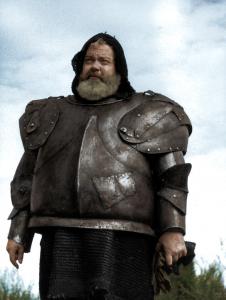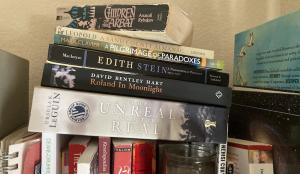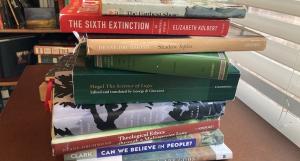What does it mean to be true to ourselves? Should I aim to speak “my truth”?
Falstaff’s Dilemma
One of my favorite scenes from Shakespeare’s plays involves Sir John Falstaff, the corpulent and hedonistic knight who appears in various plays. In this scene he pretends to be King Henry in an impromptu bit of tavern theater. The theatrics (yes, a play within the play) begin because the actual king is on his way to visit his son Prince Harry. Falstaff is worried. He knows that Harry finds carousing with Falstaff and company more interesting than anything his father might have to say. He also knows that he himself will be the subject of much of the conversation, as the King has tried many times to separate his son from the tavern crowd. So Falstaff urges Harry to “practice an answer.”
They begin: Harry will be Harry, and Falstaff will be his father, King Henry IV. The trouble, though, is that Falstaff loves the “original role” life has dealt him so much that he can’t stay on script. He winds up defending “plump Jack,” and telling Harry to by all means stay friends with this “white-bearded Satan.” When a knock at the door interrupts the play, “King Henry” is frustrated because he still as “much to say” on behalf of Falstaff.

Falstaff is so true to himself that he can’t imagine changing into someone else.
Shakespeare plays on the audience’s love for his character in various ways throughout the plays, especially around the question of repentance. Should Falstaff stop being himself, and “give over” his life to God? Does we even want that?
Speaking My Truth
This is the same anxiety I hear in our language about “my truth.” A recent conversation with my friend Doug got me thinking about this. “Speaking my truth” can work against my competing desire to share in God’s life.
While I don’t myself use “my truth” language, I also don’t dismiss it as faithless, as others might.
This is in part because I appreciate the appeal to authenticity that I hear in Falstaff’s humorous speeches. I value the desire to find the courage to name one’s own experience, and to insist that it belongs in the world.
Still, I think this language misses something. This missing element is also what makes Falstaff such a comic masterpiece. He begins with the assumption that being true to himself means being at odds with a transcendent truth. He assumes that God wants Falstaff to stop being Falstaff so he can repent and be saved.
I think God wants Falstaff to repent and be saved, but in doing so to become even more Falstaff than before.
Shakespeare himself nudges us in this direction a bit as he begins to bring forward Falstaff’s more tragic side. One of Orson Welles’s most powerful performances put this side on display. The film shows the aging knight increasingly anxious about his own death. He has heard, he tells us, the “chimes at midnight.” Welles’s Falstaff is stuck between a desire to be himself and a worry that “his truth” is missing something. . . well, true.
Discerning My Truth
Staking a claim for “my truth” can be a powerful way of showing up in a world. Especially if that world is not hospitable to my way of being a person. Maybe it’s a bit like the challenge of getting on city bus in Moscow. If I’m going to make it to where I need to be, I’m going to have to plunge in. And possibly into a crowd of passengers who would rather I didn’t!
At the same time, “my truth” can be destructive. I may not have taken the time, and formed the habits, to discern this truth very well. If not, I may be speaking a truth that is itself not all that hospitable to my fellow passengers. This is the insight from the desert fathers that following my heart’s desire is the way to destruction. Not that my desire is unimportant, but that it is untrustworthy. I need to discern, to pray, to surround myself with trusted friends and family. It’s one thing to board a bus as a passenger trying to get somewhere on the designed route. It’s another altogether to board a bus to hijack it, or to rob the passengers.
Truth on the Diagonal Way
Spiritual disciplines are my way of testing whether I’m trying to hijack the Moscow bus. Or, said differently, they help me trace a diagonal from my truth to the true God. The God who transcends yet embraces me.
I like to imagine Falstaff walking the diagonal way. This Falstaff finds himself enjoying the company and laughter in the tavern. He also monologues about his worries regarding the chimes. But during these monologues, we hear something more. In these quiet moments, we hear the knight “staying with” that joy rather than abandoning it. What is it about the happy moments of “playing Falstaff” that he loves? Could he find there the God who called him to be “plump Jack” and so much more?
This may even have been something Shakespeare tried to imagine. He promises at the end of Henry IV’s plays to bring back Falstaff for the end of the epic, Prince Hal’s own play. This play, Henry V, opens after Prince Hal rebukes Falstaff, finally, and begins his own complicated redemption narrative. For this reason, it would have surely brought us a new dimension of Falstaff’s character. But in the end Shakespeare found that teasing possibility too much for his drama to hold. All we get in Henry V is an ambiguous and comedic secondhand story of Falstaff’s deathbed repentance.
The path to discovering whom I am, the true thing that God made me for, is the path to discovering how I belong in God’s world. My truth belongs in a world filled with God’s truth. The others around me may not always be prepared to accommodate that fit, so I may have to elbow my way in. But what I will find, I trust, is a true God whose truth shows up uniquely in my one, joyful, life.















